Higher Education for Sustainability: A Critical Review of the Empirical Evidence 2013–2020
Abstract
1. Introduction
2. Methods
2.1. Search Strategy
2.2. Study Selection
2.3. Systematic Appraisal
2.4. Positionality Statement and Limitations
3. Results
3.1. Study Characteristics and Research Designs
3.2. Intervention/Exposures and Concepts of Learning
3.3. Specification of Outcomes
3.3.1. Sustainability
3.3.2. “Sustainability Knowledge”
3.3.3. “Sustainability Abilities and Skills”
3.3.4. “Sustainability Attitudes and Values”
3.3.5. “Sustainability Behavior”
3.3.6. “Sustainability Competences”
3.3.7. Sustainability: Other Outcomes
3.4. Summary of Empirical Evidence
3.4.1. Hypothesis 1: Being Exposed to Specific Curricula Positively Predicts Specific Sustainability Outcomes among Graduates
3.4.2. Hypothesis 2: Using Specific Pedagogies within Curricula Positively Predicts Specific Sustainability Outcomes among Graduates
3.4.3. Hypothesis 3: Being Exposed to or Working with Specific Content within Curricula Positively Predicts Sustainability Outcomes among Graduates
3.4.4. Hypothesis 4: Confounding Factors—Affecting the Relationships between Curriculum, Pedagogy, Content, and Sustainability Outcomes—Can Be Identified and Controlled
4. Discussion
4.1. What Should Be Learned in HESD
4.2. How It Should Be Learned
4.3. How HESD Has Been Researched
Supplementary Materials
Funding
Data Availability Statement
Acknowledgments
Conflicts of Interest
References
- Voosen, P. New climate models predict a warming surge. Science 2019, 364, 222–223. [Google Scholar] [CrossRef]
- Intergovernmental Panel on Climate Change. Climate Change and Land; Intergovernmental Panel on Climate Change: Geneva, Switzerland, 2019. [Google Scholar]
- World Atlas of Desertification; Cherlet, M., Hutchinson, C., Reynolds, J., Hill, J., Sommer, S., von Maltitz, G., Eds.; Publication Office of the European Union: Luxembourg, 2018. [Google Scholar]
- Rainie, L.; Anderson, J. Code Dependent: Pros and Cons of the Algorithm Age; Pew Research Center: Washington, DC, USA, 2017. [Google Scholar]
- Alvaredo, F.; Chancel, L.; Piketty, T.; Saez, E.; Zucman, G. The World Inequality Report 2018; Harvard University Press: Cambridge, MA, USA, 2018. [Google Scholar]
- Lotz-Sisitka, H.; Wals, A.E.J.; Kronlid, D.; McGarry, D. Transformative, transgressive social learning: Rethinking higher education pedagogy in times of systemic global dysfunction. Curr. Opin. Environ. Sustain. 2015, 16, 73–80. [Google Scholar] [CrossRef]
- UNESCO. Education for Sustainable Development Goals: Learning Objectives; United Nations Educational, Scientific and Cultural Organization: Paris, France, 2017. [Google Scholar]
- Wals, A.; Tassone, V.; Hampson, G.P.; Reams, J. Learning for walking the change: Eco-social innovation through sustainability-oriented higher education. In Routledge Handbook of Higher Education for Sustainable Development; Barth, M., Michelsen, G., Rieckmann, M., Thomas, I., Eds.; Routledge: London, UK, 2016; pp. 25–39. [Google Scholar]
- Sustainable Development Solutions Network. Getting Started with the SDGs in Universities: A Guide for Universities, Higher Education Institutions, and the Academic Sector; Australia, New Zealand and Pacific, Ed.; Sustainable Development Solutions Network: Melbourne, Australia, 2017. [Google Scholar]
- McCowan, T. Universities and the post-2015 development agenda: An analytical framework. High. Educ. 2016, 72, 505–523. [Google Scholar] [CrossRef]
- Hellberg, S.; Knutsson, B. Sustaining the life-chance divide? Education for sustainable development and the global biopolitical regime. Crit. Stud. Educ. 2018, 59, 93–107. [Google Scholar] [CrossRef]
- De Haan, G. The development of ESD-related competencies in supportive institutional frameworks. Int. Rev. Educ. 2010, 56, 315–328. [Google Scholar] [CrossRef]
- Wiek, A.; Withycombe, L.; Redman, C.L. Key competencies in sustainability: A reference framework for academic program development. Sustain. Sci. 2011, 6, 203–218. [Google Scholar] [CrossRef]
- Barnett, R. Learning for an unknown future. High. Educ. Res. Dev. 2012, 31, 65–77. [Google Scholar] [CrossRef]
- Shephard, K.; Egan, T. Higher education for professional and civic values: A critical review and analysis. Sustainability 2018, 10, 4442. [Google Scholar] [CrossRef]
- Brundiers, K.; Barth, M.; Cebrián, G.; Cohen, M.; Diaz, L.; Doucette-Remington, S.; Dripps, W.; Habron, G.; Harré, N.; Jarchow, M.; et al. Key competencies in sustainability in higher education—Toward an agreed-upon reference framework. Sustain. Sci. 2020, 16, 13–29. [Google Scholar] [CrossRef]
- Rodríguez Aboytes, J.G.; Barth, M. Transformative learning in the field of sustainability: A systematic literature review (1999–2019). Int. J. Sustain. High. Educ. 2020, 21, 993–1013. [Google Scholar] [CrossRef]
- Gomez-Olmedo, A.M.; Valor, C.; Carrero, I. Mindfulness in education for sustainable development to nurture socioemotional competencies: A systematic review and meta-analysis. Environ. Educ. Res. 2020, 26, 1527–1555. [Google Scholar] [CrossRef]
- Chen, S.Y.; Liu, S.Y. Developing students’ action competence for a sustainable future: A review of educational research. Sustainability 2020, 12, 1374. [Google Scholar] [CrossRef]
- Evans, N.; Ferreira, J.-A. What Does the Research Evidence Base Tell Us about the Use and Impact of Sustainability Pedagogies in Initial Teacher Education? Environ. Educ. Res. 2020, 26, 27–42. [Google Scholar] [CrossRef]
- Barth, M.; Rieckmann, M. State of the art in research on higher education for sustainable development. In Routledge Handbook of Higher Education for Sustainable Development; Barth, M., Michelsen, G., Rieckmann, M., Thomas, I., Eds.; Routledge: London, UK, 2016; pp. 100–113. [Google Scholar]
- Sandelowski, M.; Voils, C.I.; Leeman, J.; Crandell, J.L. Mapping the Mixed Methods-Mixed Research Terrain. J. Mix. Methods Res. 2012, 6, 317–331. [Google Scholar] [CrossRef] [PubMed]
- Petticrew, M.; Roberts, H. Systematic Reviews in the Social Sciences: A Practical Guide; Blackwell Publishing: Malden, MA, USA, 2006. [Google Scholar]
- Chernikova, O.; Heitzmann, N.; Stadler, M.; Holzberger, D.; Seidel, T.; Fischer, F. Simulation-Based Learning in Higher Education: A Meta-Analysis. Rev. Educ. Res. 2020, 90, 499–541. [Google Scholar] [CrossRef]
- Plieninger, T.; Draux, H.; Fagerholm, N.; Bieling, C.; Bürgi, M.; Kizos, T.; Kuemmerle, T.; Primdahl, J.; Verburg, P.H. The driving forces of landscape change in Europe: A systematic review of the evidence. Land Use Policy 2016, 57, 204–214. [Google Scholar] [CrossRef]
- Hainey, T.; Connolly, T.M.; Boyle, E.A.; Wilson, A.; Razak, A. A systematic literature review of games-based learning empirical evidence in primary education. Comput. Educ. 2016, 102, 202–223. [Google Scholar] [CrossRef]
- Hallinger, P.; Chatpinyakoop, C. A bibliometric review of research on higher education for sustainable development, 1998–2018. Sustainability 2019, 11, 2401. [Google Scholar] [CrossRef]
- O’Campo, P.; Kirst, M.; Schaefer-Mcdaniel, N.; Firestone, M.; Scott, A.; McShane, K. Community-based services for homeless adults experiencing concurrent mental health and substance use disorders: A realist approach to synthesizing evidence. J. Urban Health 2009, 86, 965–989. [Google Scholar] [CrossRef]
- Sant, E. Democratic Education: A Theoretical Review (2006–2017). Rev. Educ. Res. 2019, 89, 655–696. [Google Scholar] [CrossRef]
- Kohl, C.; McIntosh, E.J.; Unger, S.; Haddaway, N.R.; Kecke, S.; Schiemann, J.; Wilhelm, R. Correction to: Online tools supporting the conduct and reporting of systematic reviews and systematic maps: A case study on CADIMA and review of existing tools. Environ. Evid. 2018, 7, 12. [Google Scholar] [CrossRef]
- Bryman, A.; Becker, S.; Sempik, J. Quality criteria for quantitative, qualitative and mixed methods research: A view from social policy. Int. J. Soc. Res. Methodol. 2008, 11, 261–276. [Google Scholar] [CrossRef]
- United Nations. The Future We Want (Resolution adopted by the General Assembly on 27 July 2012). A/RES/66/288; UN: New York, NY, USA, 2012. [Google Scholar]
- *Rodríguez-Solera, C.R.; Silva-Laya, M. Higher education for sustainable development at EARTH University. Int. J. Sustain. High. Educ. 2017, 18, 278–293. [Google Scholar] [CrossRef]
- *Mosher, H.R.; Desrochers, M. The effects of information regarding sustainability issues and behavioral self-management instruction on college students’ energy conservation. Int. J. Sustain. High. Educ. 2014, 15, 359–370. [Google Scholar] [CrossRef]
- *Michel, J.O. Charting students’ exposure to promising practices of teaching about sustainability across the higher education curriculum. Teach. High. Educ. 2020, 1–27. [Google Scholar] [CrossRef]
- *Walsh, Z.; Böhme, J.; Lavelle, B.D.; Wamsler, C. Transformative education: Towards a relational, justice-oriented approach to sustainability. Int. J. Sustain. High. Educ. 2020, 21, 1587–1606. [Google Scholar] [CrossRef]
- *Zidny, R.; Eilks, I. Integrating perspectives from indigenous knowledge and Western science in secondary and higher chemistry learning to contribute to sustainability education. Sustain. Chem. Pharm. 2020, 16, 100229. [Google Scholar] [CrossRef]
- *Macintyre, T.; Chaves, M.; Monroy, T.; Zethelius, M.O.; Villarreal, T.; Tassone, V.C.; Wals, A.E.J. Transgressing boundaries between community learning and higher education: Levers and barriers. Sustainability 2020, 12, 2601. [Google Scholar] [CrossRef]
- *Haigh, M. Fostering Global Citizenship—Tree planting as a connective practice. J. Geogr. High. Educ. 2016, 40, 509–530. [Google Scholar] [CrossRef]
- *Raus, R. Student Teacher Ecological Self in the Context of Education for Sustainable Development: A Longitudinal Case Study. J. Educ. Sustain. Dev. 2017, 11, 123–140. [Google Scholar] [CrossRef]
- *Brandt, J.O.; Bürgener, L.; Barth, M.; Redman, A. Becoming a competent teacher in education for sustainable development: Learning outcomes and processes in teacher education. Int. J. Sustain. High. Educ. 2019, 20, 630–653. [Google Scholar] [CrossRef]
- *Armstrong, C.M.; Hustvedt, G.; LeHew, M.L.A.; Anderson, B.G.; Hiller Connell, K.Y. When the informal is the formal, the implicit is the explicit: Holistic sustainability education at Green Mountain College. Int. J. Sustain. High. Educ. 2016, 17, 756–775. [Google Scholar] [CrossRef]
- *Albert, C.; von Haaren, C.; Vargas-Moreno, J.C.; Steinitz, C. Teaching scenario-based planning for sustainable landscape development: An Evaluation of learning effects in the Cagliari studio workshop. Sustainability 2015, 7, 6872–6892. [Google Scholar] [CrossRef]
- *Cebrián, G.; Pascual, D.; Moraleda, Á. Perception of sustainability competencies amongst Spanish pre-service secondary school teachers. Int. J. Sustain. High. Educ. 2019, 20, 1171–1190. [Google Scholar] [CrossRef]
- *Strack, M.; Shephard, K.; Jowett, T.; Mogford, S.; Skeaff, S.; Mirosa, M. Monitoring surveying students’ environmental attitudes as they experience higher education in New Zealand. Surv. Rev. 2019, 51, 257–264. [Google Scholar] [CrossRef]
- *Piyapong, J. Factors Affecting Environmental Activism, Nonactivist Behaviors, and the Private Sphere Green Behaviors of Thai University Students. Educ. Urban Soc. 2020, 52, 619–648. [Google Scholar] [CrossRef]
- *Robinson, Z.P. Are geography students good “environmental citizens?” A comparison between year of study and over time. J. Geogr. High. Educ. 2015, 39, 245–259. [Google Scholar] [CrossRef][Green Version]
- *Desrochers, M.N.; Mosher, H. Evaluation of an informational and behavior change program to increase students’ self-reported energy conservation. Behav. Interv. 2017, 32, 225–233. [Google Scholar] [CrossRef]
- *Wisecup, A.K.; Grady, D.; Roth, R.A.; Stephens, J. A comparative study of the efficacy of intervention strategies on student electricity use in campus residence halls. Int. J. Sustain. High. Educ. 2017, 18, 503–519. [Google Scholar] [CrossRef]
- *Hooi Ting, D.; Chin Cheng, C.F. Measuring the marginal effect of pro-environmental behaviour: Guided learning and behavioural enhancement. J. Hosp. Leis. Sport Tour. Educ. 2017, 20, 16–26. [Google Scholar] [CrossRef]
- *Belluigi, D.Z.; Cundill, G. Establishing enabling conditions to develop critical thinking skills: A case of innovative curriculum design in Environmental Science. Environ. Educ. Res. 2017, 23, 950–971. [Google Scholar] [CrossRef]
- *Redman, A.; Redman, E. Is subjective knowledge the key to fostering sustainable behavior? Mixed evidence from an education intervention in Mexico. Educ. Sci. 2017, 7, 4. [Google Scholar] [CrossRef]
- *Sims, L. Learning for sustainability through CIDA’s “Community-based pest management in Central American agriculture” project: A deliberative, experiential and iterative process. J. Environ. Plan. Manag. 2016, 60, 538–557. [Google Scholar] [CrossRef]
- *Rampasso, I.S.; Quelhas, O.L.G.; Anholon, R.; Silva, L.E.; Ávila, T.P.; Matsutani, L.; Yparraguirre, I.T.R. Preparing future professionals to act towards sustainable development: An analysis of undergraduate students’ motivations towards voluntary activities. Int. J. Sustain. Dev. World Ecol. 2020, 28, 157–165. [Google Scholar] [CrossRef]
- *Wodika, A.B.; Middleton, W.K. Climate change advocacy: Exploring links between student empowerment and civic engagement. Int. J. Sustain. High. Educ. 2020, 21, 1209–1231. [Google Scholar] [CrossRef]
- *Holdsworth, S.; Thomas, I.; Sandri, O. Assessing Graduate Sustainability Attributes Using a Vignette/Scenario Approach. J. Educ. Sustain. Dev. 2018, 12, 120–139. [Google Scholar] [CrossRef]
- *Albareda-Tiana, S.; García-González, E.; Jiménez-Fontana, R.; Solís-Espallargas, C. Implementing pedagogical approaches for ESD in initial teacher training at Spanish universities. Sustainability 2019, 11, 4927. [Google Scholar] [CrossRef]
- *Corriveau, A.M. Developing authentic leadership as a starting point to responsible management: A Canadian university case study. Int. J. Manag. Educ. 2020, 18, 100364. [Google Scholar] [CrossRef]
- *Jouan, J.; De Graeuwe, M.; Carof, M.; Baccar, R.; Bareille, N.; Bastian, S.; Brogna, D.; Burgio, G.; Couvreur, S.; Cupial, M.; et al. Learning Interdisciplinarity and systems approaches in agroecology: Experience with the serious game SEGAE. Sustainability 2020, 12, 4351. [Google Scholar] [CrossRef]
- *Platje, J.; Will, M.; Van Dam, Y.K. A fragility approach to sustainability—Researching effects of education. Int. J. Sustain. High. Educ. 2019, 20, 1220–1239. [Google Scholar] [CrossRef]
- *Ouellet Dallaire, C.; Trincsi, K.; Ward, M.K.; Harris, L.I.; Jarvis, L.; Dryden, R.L.; MacDonald, G.K. Creating space for sustainability literacy: The case of student-centered symposia. Int. J. Sustain. High. Educ. 2018, 19, 839–855. [Google Scholar] [CrossRef]
- *Burns, H.L. Learning sustainability leadership: An action research study of a graduate leadership course. Int. J. Scholarsh. Teach. Learn. 2016, 10, 2. [Google Scholar] [CrossRef]
- *Roysen, R.; Cruz, T.C. Educating for transitions: Ecovillages as transdisciplinary sustainability “classrooms”. Int. J. Sustain. High. Educ. 2020, 21, 977–992. [Google Scholar] [CrossRef]
- *Kopnina, H. Metaphors of nature and economic development: Critical education for sustainable business. Sustainability 2014, 6, 7496–7513. [Google Scholar] [CrossRef]
- Bloom, B. Taxonomy of Educational Objectives. The Classification of Educational Goals; Longmans: London, UK, 1956. [Google Scholar]
- *Sammalisto, K.; Sundström, A.; Von Haartman, R.; Holm, T.; Yao, Z. Learning about sustainability-what influences students’ self-perceived sustainability actions after undergraduate education? Sustainability 2016, 8, 510. [Google Scholar] [CrossRef]
- *Çimşir, B.T.; Uzunboylu, H. Awareness training for sustainable development: Development, implementation and evaluation of a mobile application. Sustainability 2019, 11, 611. [Google Scholar] [CrossRef]
- *Zsóka, Á.; Szerényi, Z.M.; Széchy, A.; Kocsis, T. Greening due to environmental education? Environmental knowledge, attitudes, consumer behavior and everyday pro-environmental activities of Hungarian high school and university students. J. Clean. Prod. 2013, 48, 126–138. [Google Scholar] [CrossRef]
- *Mintz, K.; Tal, T. Sustainability in higher education courses: Multiple learning outcomes. Stud. Educ. Eval. 2014, 41, 113–123. [Google Scholar] [CrossRef]
- *Koch, S.; Barkmann, J.; Strack, M.; Sundawati, L.; Bögeholz, S. Knowledge of indonesian university students on the sustainable management of natural resources. Sustainability 2013, 5, 1443–1460. [Google Scholar] [CrossRef]
- *Rosenkränzer, F.; Kramer, T.; Hörsch, C.; Schuler, S.; Rieß, W. Promoting Student Teachers’ Content Related Knowledge in Teaching Systems Thinking: Measuring Effects of an Intervention through Evaluating a Videotaped Lesson. High. Educ. Stud. 2016, 6, 156. [Google Scholar] [CrossRef]
- *Miñano, R.; Uruburu, Á.; Moreno-Romero, A.; Pérez-López, D. Strategies for Teaching Professional Ethics to IT Engineering Degree Students and Evaluating the Result. Sci. Eng. Ethics 2017, 23, 263–286. [Google Scholar] [CrossRef] [PubMed]
- *Elster, D.; Müller, N.; Drachenberg, S. Promotion of system competence based on the syndrome approach in pre-service biology teacher education. In Contextualizing Teaching to Improve Learning: The Case of Science and Geography; Leite, L., Dourado, L., Afonso, A.S., Morgado, S., Eds.; Nova Science Publishers: Hauppauge, NY, USA, 2017; pp. 123–142. ISBN 9781536118698. [Google Scholar]
- *Saitua-Iribar, A.; Corral-Lage, J.; Peña-Miguel, N. Improving knowledge about the sustainable development goals through a collaborative learning methodology and serious game. Sustainability 2020, 12, 6169. [Google Scholar] [CrossRef]
- *Zeegers, Y.; Clark, I.F. Students’ perceptions of education for sustainable development. Int. J. Sustain. High. Educ. 2014, 15, 242–253. [Google Scholar] [CrossRef]
- *Gilbert, L.A.; Gross, D.S.; Kreutz, K.J. Developing Undergraduate Students’ Systems Thinking Skills with an Integrate Module. J. Geosci. Educ. 2019, 67, 34–49. [Google Scholar] [CrossRef]
- *Mobley, C.; Lee, C.; Morse, J.C.; Allen, J.; Murphy, C. Learning about sustainability: An interdisciplinary graduate seminar in biocomplexity. Int. J. Sustain. High. Educ. 2014, 15, 16–33. [Google Scholar] [CrossRef]
- *McGrath, G.M.; Lockstone-Binney, L.; Ong, F.; Wilson-Evered, E.; Blaer, M.; Whitelaw, P. Teaching sustainability in tourism education: A teaching simulation. J. Sustain. Tour. 2020, 29, 795–812. [Google Scholar] [CrossRef]
- *Fanta, D.; Braeutigam, J.; Riess, W. Fostering systems thinking in student teachers of biology and geography–An intervention study. J. Biol. Educ. 2020, 54, 226–244. [Google Scholar] [CrossRef]
- *Jollands, M.; Parthasarathy, R. Developing engineering students’ understanding of sustainability using project based learning. Sustainability 2013, 5, 5052–5066. [Google Scholar] [CrossRef]
- *Hu, M.; Shealy, T.; Grohs, J.; Panneton, R. Empirical evidence that concept mapping reduces neurocognitive effort during concept generation for sustainability. J. Clean. Prod. 2019, 238, 117815. [Google Scholar] [CrossRef]
- *Oxenswärdh, A.; Persson-Fischier, U. Mapping master students’ processes of problem solving and learning in groups in sustainability education. Sustainability 2020, 12, 5299. [Google Scholar] [CrossRef]
- *Liang, C.; Chang, W.S.; Yao, S.N.; King, J.T.; Chen, S.A. Stimulating the imaginative capacities of agricultural extension students. J. Agric. Educ. Ext. 2016, 22, 327–344. [Google Scholar] [CrossRef]
- *Kinkead, J.; Curtis, K. Seeking SOLE Food: Service-Learning and Sustainability in Honors Think Tank Courses. J. Serv. High. Educ. 2018, 8, EJ1193195. [Google Scholar]
- *Heinrich, W.F.; Habron, G.B.; Johnson, H.L.; Goralnik, L. Critical Thinking Assessment Across Four Sustainability-Related Experiential Learning Settings. J. Exp. Educ. 2015, 38, 373–393. [Google Scholar] [CrossRef]
- *Walker, R. Learning is like a lava lamp: The student journey to critical thinking. Res. Post-Compuls. Educ. 2017, 22, 495–512. [Google Scholar] [CrossRef]
- *Rambaree, K. Environmental social work: Implications for accelerating the implementation of sustainable development in social work curricula. Int. J. Sustain. High. Educ. 2020, 21, 557–574. [Google Scholar] [CrossRef]
- *Deer, S.; Zarestky, J. Balancing Profit and People: Corporate Social Responsibility in Business Education. J. Manag. Educ. 2017, 41, 727–749. [Google Scholar] [CrossRef]
- *Scott Stanford, M.; Benson, L.C.; Alluri, P.; Martin, W.D.; Klotz, L.E.; Ogle, J.H.; Kaye, N.; Sarasua, W.; Schiff, S. Evaluating student and faculty outcomes for a real-world capstone project with sustainability considerations. J. Prof. Issues Eng. Educ. Pract. 2013, 139, 123–133. [Google Scholar] [CrossRef]
- *Urquidi-Martín, A.C.; Tamarit-Aznar, C.; Sánchez-García, J. Determinants of the effectiveness of using renewable resource management-based simulations in the development of critical thinking: An application of the experiential learning theory. Sustainability 2019, 11, 5469. [Google Scholar] [CrossRef]
- *McCormick, M.; Bielefeldt, A.R.; Swan, C.W.; Paterson, K.G. Assessing students’ motivation to engage in sustainable engineering. Int. J. Sustain. High. Educ. 2015, 16, 136–154. [Google Scholar] [CrossRef]
- *Zoller, U. Research-based transformative science/STEM/STES/STESEP education for “Sustainability Thinking”: From teaching to “Know” to learning to “Think”. Sustainability 2015, 7, 4474–4491. [Google Scholar] [CrossRef]
- *Martinez-Campillo, A.; del Pilar Sierra-Fernandez, M.; Fernandez-Santos, Y.; Martínez-Campillo, A.; del Sierra-Fernández, M.P.; Fernández-Santos, Y. Service-learning for sustainability entrepreneurship in rural areas: What is its global impact on business university students? Sustainability 2019, 11, 5296. [Google Scholar] [CrossRef]
- *Piasentin, F.B.; Roberts, L. What elements in a sustainability course contribute to paradigm change and action competence? A study at Lincoln University, New Zealand. Environ. Educ. Res. 2018, 24, 694–715. [Google Scholar] [CrossRef]
- *Ruiz-Palomino, P.; Martínez-Cañas, R.; Jiménez-Estévez, P. Are corporate social responsibility courses effective? A longitudinal and gender-based analysis in undergraduate students. Sustainability 2019, 11, 6033. [Google Scholar] [CrossRef]
- *Yusop, F.D.; Correia, A.P. On becoming a civic-minded instructional designer: An ethnographic study of an instructional design experience. Br. J. Educ. Technol. 2014, 45, 782–792. [Google Scholar] [CrossRef]
- *Thomas, I.; Holdsworth, S.; Sandri, O. Graduate ability to show workplace sustainability leadership: Demonstration of an assessment tool. Sustain. Sci. 2020, 15, 1211–1221. [Google Scholar] [CrossRef]
- *Kalsoom, Q.; Khanam, A. Inquiry into sustainability issues by preservice teachers: A pedagogy to enhance sustainability consciousness. J. Clean. Prod 2017, 164, 1301–1311. [Google Scholar] [CrossRef]
- *Yeung, S.K.; So, W.M.W.; Cheng, N.Y.I.; Cheung, T.Y.; Chow, C.F. Comparing pedagogies for plastic waste management at university level. Int. J. Sustain. High. Educ. 2017, 18, 1039–1059. [Google Scholar]
- *Felgendreher, S.; Löfgren, Å. Higher education for sustainability: Can education affect moral perceptions? Environ. Educ. Res. 2018, 24, 479–491. [Google Scholar] [CrossRef]
- *Major, L.; Namestovski, Ž.; Horák, R.; Bagány, Á.; Krekić, V.P. Teach it to sustain it! Environmental attitudes of Hungarian teacher training students in Serbia. J. Clean. Prod. 2017, 154, 255–268. [Google Scholar] [CrossRef]
- *Probst, L.; Bardach, L.; Kamusingize, D.; Templer, N.; Ogwali, H.; Owamani, A.; Mulumba, L.; Onwonga, R.; Adugna, B.T.T. A transformative university learning experience contributes to sustainability attitudes, skills and agency. J. Clean. Prod. 2019, 232, 648–656. [Google Scholar] [CrossRef]
- *Kokkarinen, N.; Cotgrave, A.J. Sustainability literacy in action: Student experiences. Struct. Surv. 2013, 31, 56–66. [Google Scholar] [CrossRef]
- *Lin, C.I.; Li, Y.Y. Protecting life on land and below water: Using storytelling to promote undergraduate students’ attitudes toward animals. Sustainability 2018, 10, 2479. [Google Scholar] [CrossRef]
- *Hurtado-Soler, A.; Marín-Liébana, P.; Martínez-Gallego, S.; Botella-Nicolás, A.M. The Garden and Landscape as an Interdisciplinary Resource Between Experimental Science and Artistic–Musical Expression: Analysis of Competence Development in Student Teachers. Front. Psychol. 2020, 11, 2163. [Google Scholar] [CrossRef]
- *Álvarez-García, O.; Sureda-Negre, J.; Comas-Forgas, R. Assessing environmental competencies of primary education pre-service teachers in Spain: A comparative study between two universities. Int. J. Sustain. High. Educ. 2018, 19, 15–31. [Google Scholar] [CrossRef]
- *Murray, P.; Goodhew, J.; Murray, S. The heart of ESD: Personally engaging learners with sustainability. Environ. Educ. Res. 2014, 20, 718–734. [Google Scholar] [CrossRef]
- *Andersson, K.; Jagers, S.C.; Lindskog, A.; Martinsson, J. Learning for the future: Effects of education for sustainable development (ESD) on teacher education students. Sustainability 2013, 5, 5135–5152. [Google Scholar] [CrossRef]
- *Del Carmen Olmos-Gómez, M.; Estrada-Vidal, L.I.; Ruiz-Garzón, F.; López-Cordero, R.; Mohamed-Mohand, L. Making future teachers more aware of issues related to sustainability: An assessment of best practices. Sustainability 2019, 11, 7222. [Google Scholar] [CrossRef]
- *Deutsch, N.; Berényi, L. Personal approach to sustainability of future decision makers: A Hungarian case. Environ. Dev. Sustain. 2018, 20, 271–303. [Google Scholar] [CrossRef]
- *Savageau, A.E. Let’s get personal: Making sustainability tangible to students. Int. J. Sustain. High. Educ. 2013, 14, 15–24. [Google Scholar] [CrossRef]
- *Oliveira, S.; Marco, E. Preventing or inventing? Understanding the effects of non-prescriptive design briefs. Int. J. Technol. Des. Educ. 2017, 27, 549–561. [Google Scholar] [CrossRef][Green Version]
- *Browne, G.R.; Bender, H.; Bradley, J.; Pang, A. Evaluation of a tertiary sustainability experiential learning program. Int. J. Sustain. High. Educ. 2020, 21, 699–715. [Google Scholar] [CrossRef]
- *Paige, K. Educating for sustainability: Environmental pledges as part of tertiary pedagogical practice in science teacher education. Asia-Pac. J. Teach. Educ. 2017, 45, 285–301. [Google Scholar] [CrossRef]
- *Frank, P.; Stanszus, L.S. Transforming consumer behavior: Introducing self-inquiry-based and self-experience-based learning for building personal competencies for sustainable consumption. Sustainability 2019, 11, 2550. [Google Scholar] [CrossRef]
- *Escobar-Tello, M.C.; Bhamra, T. Happiness as a harmonising path for bringing higher education towards sustainability. Environ. Dev. Sustain. 2013, 15, 177–197. [Google Scholar] [CrossRef]
- *Goldman, D.; Ayalon, O.; Baum, D.; Haham, S. Major matters: Relationship between academic major and university students’ environmental literacy and citizenship as reflected in their voting decisions and environmental activism. Int. J. Environ. Sci. Educ. 2015, 10, 671–693. [Google Scholar] [CrossRef]
- *Hatipoglu, B.; Ertuna, B.; Sasidharan, V. A referential methodology for education on sustainable tourism development. Sustainability 2014, 6, 5029–5048. [Google Scholar] [CrossRef]
- *Borges, F. Knowledge, Attitudes and Behaviours Concerning Sustainable Development: A Study among Prospective Elementary Teachers. High. Educ. Stud. 2019, 9, 22. [Google Scholar] [CrossRef]
- Dictionary Oxford. Oxford Learner’s Dictionary: Competence; Oxford University Press: Oxford, UK, 2021. [Google Scholar]
- *Otto, D.; Caeiro, S.; Nicolau, P.; Disterheft, A.; Teixeira, A.; Becker, S.; Bollmann, A.; Sander, K. Can MOOCs empower people to critically think about climate change? A learning outcome based comparison of two MOOCs. J. Clean. Prod. 2019, 222, 12–21. [Google Scholar] [CrossRef]
- *Sivapalan, S. Sustainability, blended learning and the undergraduate communication skills classroom: Negotiating engineering undergraduates’ expectations and perceptions. Horizon 2017, 25, 7–23. [Google Scholar] [CrossRef]
- *Sales de Aguiar, T.R.; Paterson, A.S. Sustainability on campus: Knowledge creation through social and environmental reporting. Stud. High. Educ. 2018, 43, 1882–1894. [Google Scholar] [CrossRef]
- *Trencher, G.; Vincent, S.; Bahr, K.; Kudo, S.; Markham, K.; Yamanaka, Y. Evaluating core competencies development in sustainability and environmental master’s programs: An empirical analysis. J. Clean. Prod. 2018, 181, 829–841. [Google Scholar] [CrossRef]
- *Thomas, I.; Depasquale, J. Connecting curriculum, capabilities and careers. Int. J. Sustain. High. Educ. 2016, 17, 738–755. [Google Scholar] [CrossRef]
- *Ceulemans, G.; Severijns, N. Challenges and benefits of student sustainability research projects in view of education for sustainability. Int. J. Sustain. High. Educ. 2019, 20, 482–499. [Google Scholar] [CrossRef]
- *Savage, E.; Tapics, T.; Evarts, J.; Wilson, J.; Tirone, S. Experiential learning for sustainability leadership in higher education. Int. J. Sustain. High. Educ. 2015, 16, 692–705. [Google Scholar] [CrossRef]
- *Álvarez-García, O.; García-Escudero, L.Á.; Salvà-Mut, F.; Calvo-Sastre, A. Variables influencing pre-service teacher training in education for sustainable development: A case study of two Spanish universities. Sustainability 2019, 11, 4412. [Google Scholar] [CrossRef]
- *Fuertes-Camacho, M.T.; Graell-Martín, M.; Fuentes-Loss, M.; Balaguer-Fàbregas, M.C. Integrating sustainability into higher education curricula through the project method, a global learning strategy. Sustainability 2019, 11, 767. [Google Scholar] [CrossRef]
- *Galt, R.E.; Parr, D.; Jagannath, J. Facilitating competency development in sustainable agriculture and food systems education: A self-assessment approach. Int. J. Agric. Sustain. 2013, 11, 69–88. [Google Scholar] [CrossRef]
- *Lukman, R.K.; Virtič, P. Developing energy concept maps—An innovative educational tool for energy planning. J. Sustain. Dev. Energy, Water Environ. Syst. 2018, 6, 742–754. [Google Scholar] [CrossRef]
- *Torres-Antonini, M. Building the future: The solar decathlon as education for future sustainability leadership. Sustainability 2013, 6, 48–56. [Google Scholar] [CrossRef]
- *Weijs, R.; Bekebrede, G.; Nikolic, I. Sustainable competence development of business students: Effectiveness of using serious games. In Games and Learning Alliance; Bottino, R., Jeuring, J., Veltkamp, R.C., Eds.; Springer: Berlin/Heidelberg, Germany, 2016; pp. 3–14. ISBN 9783319501819. [Google Scholar]
- *Elmassah, S.; Biltagy, M.; Gamal, D. Engendering sustainable development competencies in higher education: The case of Egypt. J. Clean. Prod. 2020, 266, 121959. [Google Scholar] [CrossRef]
- *Gedžūne, I. Identification as Incentive to Care: Pre-service Teachers’ Orientation Towards Inclusion in Nature. Discourse Commun. Sustain. Educ. 2015, 6, 110–126. [Google Scholar] [CrossRef]
- *Walshe, N.; Tait, V. Making connections: A conference approach to developing transformative environmental and sustainability education within initial teacher education. Environ. Educ. Res. 2019, 25, 1731–1750. [Google Scholar] [CrossRef]
- *Amador, F.; Martinho, A.P.; Bacelar-Nicolau, P.; Caeiro, S.; Oliveira, C.P. Education for sustainable development in higher education: Evaluating coherence between theory and praxis. Assess. Eval. High. Educ. 2015, 40, 867–882. [Google Scholar] [CrossRef]
- *Effeney, G.; Davis, J. Education for sustainability: A case study of pre-service primary teachers’ knowledge and efficacy. Aust. J. Teach. Educ 2013, 38, 32–46. [Google Scholar] [CrossRef]
- *Valderrama-Hernández, R.; Sánchez-Carracedo, F.; Rubio, L.A.; Limón-Domínguez, D. Methodology to analyze the effectiveness of ESD in a higher degree in education. A case study. Sustainability 2020, 12, 222. [Google Scholar] [CrossRef]
- *Lund, T.; Francis, C.; Pederson, K.; Lieblein, G.; Rahman, M.H. Translating Knowledge into Action at the Norwegian University of Life Sciences (UMB). J. Agric. Educ. Ext. 2014, 20, 537–554. [Google Scholar] [CrossRef]
- *Bask, A.; Halme, M.; Kallio, M.; Kuula, M. Business students’ value priorities and attitudes towards sustainable development. J. Clean. Prod. 2020, 264, 121711. [Google Scholar] [CrossRef]
- *Cotton, D.; Alcock, I. Commitment to environmental sustainability in the UK student population. Stud. High. Educ. 2013, 38, 1457–1471. [Google Scholar] [CrossRef]
- *Shephard, K.; Harraway, J.; Jowett, T.; Lovelock, B.; Skeaff, S.; Slooten, L.; Strack, M.; Furnari, M. Longitudinal analysis of the environmental attitudes of university students. Environ. Educ. Res. 2015, 21, 805–820. [Google Scholar] [CrossRef]
- *Bielefeldt, A.R.; Jones, S.A.; Price, J.M.; Grahame, K.S.; Gillen, A. Impacts of sustainability education on the attitudes of engineering students. In Proceedings of the 2016 ASEE Annual Conference & Exposition, New Orleans, Louisiana, 26–28 June 2016. [Google Scholar]
- *Goldman, D.; Yavetz, B.; Pe’er, S. Student teachers’ attainment of environmental literacy in relation to their disciplinary major during undergraduate studies. Int. J. Environ. Sci. Educ. 2014, 9, 369–383. [Google Scholar] [CrossRef]
- *Yavetz, B.; Goldman, D.; Pe’er, S. How do preservice teachers perceive “environment” and its relevance to their area of teaching? Environ. Educ. Res. 2014, 20, 354–371. [Google Scholar] [CrossRef]
- *Kukkonen, J.; Kärkkäinen, S.; Keinonen, T. Examining the relationships between factors influencing environmental behaviour among university students. Sustainability 2018, 10, 4294. [Google Scholar] [CrossRef]
- *Sidiropoulos, E. The personal context of student learning for sustainability: Results of a multi-university research study. J. Clean. Prod. 2018, 181, 537–554. [Google Scholar] [CrossRef]
- *Chuvieco, E.; Burgui-Burgui, M.; Da Silva, E.V.; Hussein, K.; Alkaabi, K. Factors affecting environmental sustainability habits of university students: Intercomparison analysis in three countries (Spain, Brazil and UAE). J. Clean. Prod. 2018, 198, 1372–1380. [Google Scholar] [CrossRef]
- *Muñoz-Rodríguez, J.M.; Sánchez-Carracedo, F.; Barrón-Ruiz, Á.; Serrate-González, S. Are we training in sustainability in higher education? Case study: Education degrees at the university of Salamanca. Sustainability 2020, 12, 4421. [Google Scholar] [CrossRef]
- *Ketchman, K.; Dancz, C.L.A.; Burke, R.D.; Parrish, K.; Landis, A.E.; Bilec, M.M. Sustainable Engineering Cognitive Outcomes: Examining Different Approaches for Curriculum Integration. J. Prof. Issues Eng. Educ. Pract. 2017, 143. [Google Scholar] [CrossRef]
- *Watson, M.K.; Pelkey, J.; Noyes, C.; Rodgers, M. Assessing impacts of a learning-cycle-based module on students’ conceptual sustainability knowledge using concept maps and surveys. J. Clean. Prod. 2016, 133, 544–556. [Google Scholar] [CrossRef]
- *Tsai, C.Y. The effect of online argumentation of socio-scientific issues on students’ scientific competencies and sustainability attitudes. Comput. Educ. 2018, 116, 14–27. [Google Scholar] [CrossRef]
- *Zhao, Q.; Liu, X.; Ma, Y.; Zheng, X.; Yu, M.; Wu, D. Application of the modified college impact model to understand chinese engineering undergraduates’ sustainability consciousness. Sustainability 2020, 12, 2641. [Google Scholar] [CrossRef]
- *Cheng, Z.; Watson, S.L.; Watson, W.R.; Janakiraman, S. Attitudinal Learning in Large-Enrollment Classrooms: A Case Study. TechTrends Link. Res. Pract. Improv. Learn. 2020, 64, 158–171. [Google Scholar] [CrossRef]
- *Tarrant, M.A.; Rubin, D.L.; Stoner, L. The Added Value of Study Abroad: Fostering a Global Citizenry. J. Stud. Int. Educ. 2014, 18, 141–161. [Google Scholar] [CrossRef]
- *Jegstad, K.M.; Gjøtterud, S.M.; Sinnes, A.T. Science Teacher Education for Sustainable Development: A Case Study of a Residential Field Course in a Norwegian Pre-Service Teacher Education Programme. J. Adventure Educ. Outdoor Learn. 2018, 18, 99–114. [Google Scholar] [CrossRef]
- *Valsan, V.; Sreekumar, G.; Chekkichalil, V.; Kumar, A.S. Effects of service-learning education among engineering undergraduates: A scientific perspective on sustainable waste management. Procedia Comput. Sci. 2020, 172, 770–776. [Google Scholar] [CrossRef]
- *Brassler, M.; Dettmers, J. How to Enhance Interdisciplinary Competence--Interdisciplinary Problem-Based Learning versus Interdisciplinary Project-Based Learning. Interdiscip. J. Probl. Learn. 2017, 11, 1–15. [Google Scholar] [CrossRef]
- *Soini, K.; Korhonen-Kurki, K.; Asikainen, H. Transactional learning and sustainability co-creation in a university—Business collaboration. Int. J. Sustain. High. Educ. 2019, 20, 965–984. [Google Scholar] [CrossRef]
- *Whiteside, M.; Bould, E.; Tsey, K.; Venville, A.; Cadet-James, Y.; Morris, M.E. Promoting Twenty-first-century Student Competencies: A Wellbeing Approach. Aust. Soc. Work 2017, 70, 324–336. [Google Scholar] [CrossRef]
- *Cruz, J.; Alshammari, F.; Felicilda-Reynaldo, R. Predictors of Saudi nursing students’ attitudes towards environment and sustainability in health care. Int. Nurs. Rev. 2018, 65, 408–416. [Google Scholar] [CrossRef]
- *Sidiropoulos, E.; Wex, I.; Sibley, J. Supporting the sustainability journey of tertiary international students in Australia. Aust. J. Environ. Educ. 2013, 29, 52–79. [Google Scholar] [CrossRef]
- *Andersson, K. Starting the pluralistic tradition of teaching? Effects of education for sustainable development (ESD) on pre-service teachers’ views on teaching about sustainable development. Environ. Educ. Res. 2017, 23, 436–449. [Google Scholar] [CrossRef]
- *Navarro, V.; Martínez, O.; Miranda, J.; Rada, D.; Bustamante, M.Á.; Etaio, I.; Lasa, A.; Simón, E.; Churruca, I. Including aspects of sustainability in the degree in Human Nutrition and Dietetics: An evaluation based on student perceptions. J. Clean. Prod. 2020, 243, 118545. [Google Scholar] [CrossRef]
- *Remington-Doucette, S.; Musgrove, S. Variation in sustainability competency development according to age, gender, and disciplinary affiliation: Implications for teaching practice and overall program structure. Int. J. Sustain. High. Educ. 2015, 16, 537–575. [Google Scholar] [CrossRef]
- UNESCO. Framework for the Implementation of Education for Sustainable Development (ESD) beyond 2019 (40 C/23); United Nations Educational, Scientific and Cultural Organization: Geneva, Switzerland, 2019. [Google Scholar]
- Purvis, B.; Mao, Y.; Robinson, D. Three pillars of sustainability: In search of conceptual origins. Sustain. Sci. 2019, 14, 681–695. [Google Scholar] [CrossRef]
- Wals, A.; Jickling, B. “Sustainability” in higher education: From doublethink and newspeak to critical thinking and meaningful learning. Int. J. Sustain. High. Educ. 2002, 3, 221–232. [Google Scholar] [CrossRef]
- Jickling, B. Losing traction and the art of slip-sliding away: Or, getting over education for sustainable development. J. Environ. Educ. 2016, 47, 128–138. [Google Scholar] [CrossRef]
- Shephard, K. Higher education for sustainability: Seeking affective learning outcomes. Int. J. Sustain. High. Educ. 2008, 9, 87–98. [Google Scholar] [CrossRef]
- Ajzen, I.; Fishbein, M.; Lohmann, S.; Albarracín, D. The Influence of Attitudes on Behavior. In The Handbook of Attitudes, Volume 1: Basic Principles; Albarracin, D., Johnson, B.T., Eds.; Routledge: New York, NY, USA, 2018; pp. 173–221. [Google Scholar]
- Schwartz, S.H. Are There Universal Aspects in the Structure and Contents of Human Values? J. Soc. Issues 1994, 50, 19–45. [Google Scholar] [CrossRef]
- Shephard, K. On the educational Difference between Being Able and Being Willing [Paper presentation]. In Proceedings of the European Conference on Educational Research, Geneva, Switzerland, 6–10 September 2021. [Google Scholar]
- Corcoran, P.B.; Walker, K.E.; Wals, A.E.J. Case studies, make-your-case studies, and case stories: A critique of case-study methodology in sustainability in higher education. Environ. Educ. Res. 2004, 10, 7–21. [Google Scholar] [CrossRef]
- Kyburz-Graber, R. Case Study Research on Higher Education for Sustainable Development. In Routledge Handbook of Higher Education for Sustainable Development; Barth, M., Michelsen, G., Rieckmann, M., Thomas, I., Eds.; Routledge: London, UK, 2016; pp. 150–165. [Google Scholar]

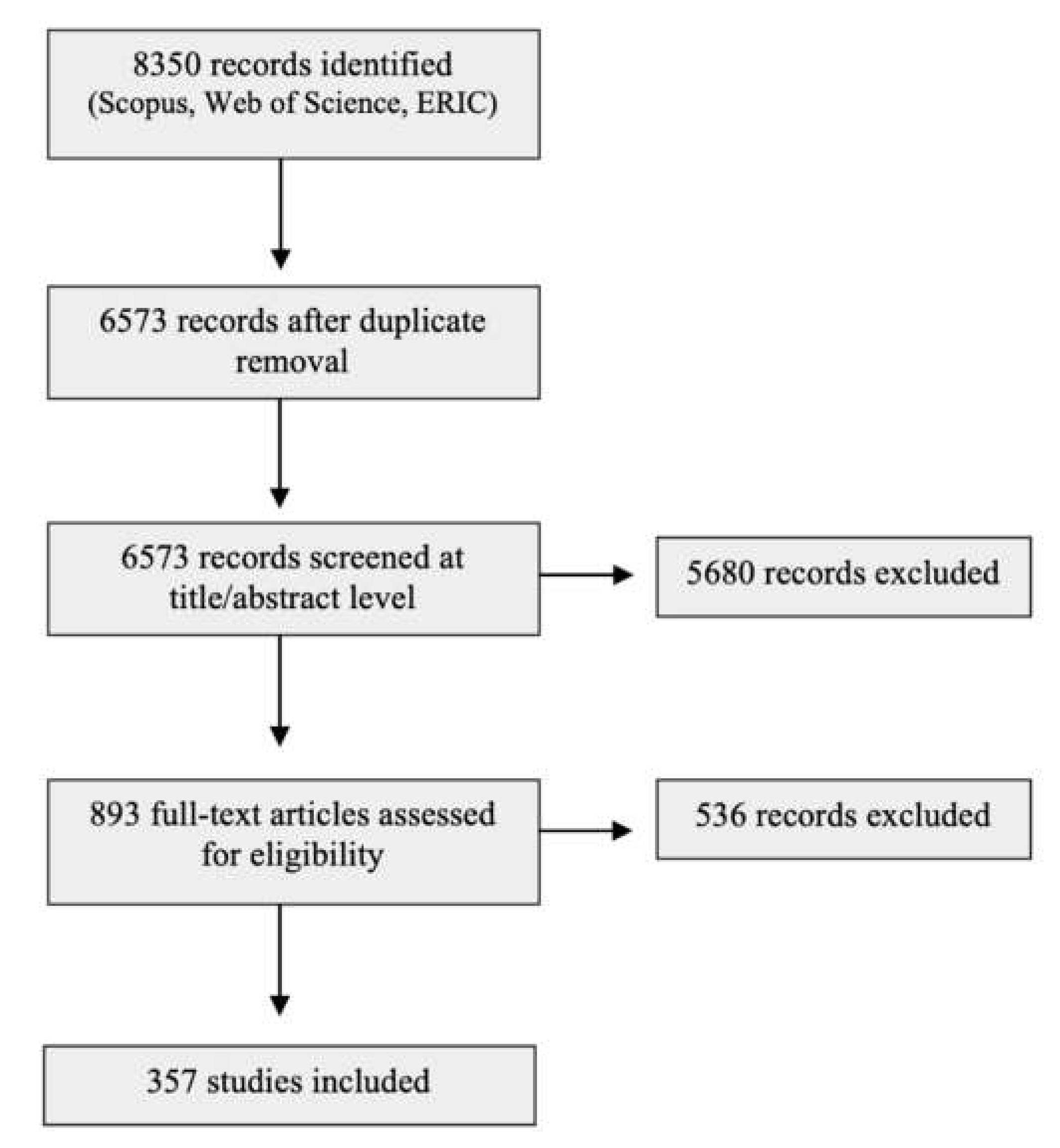
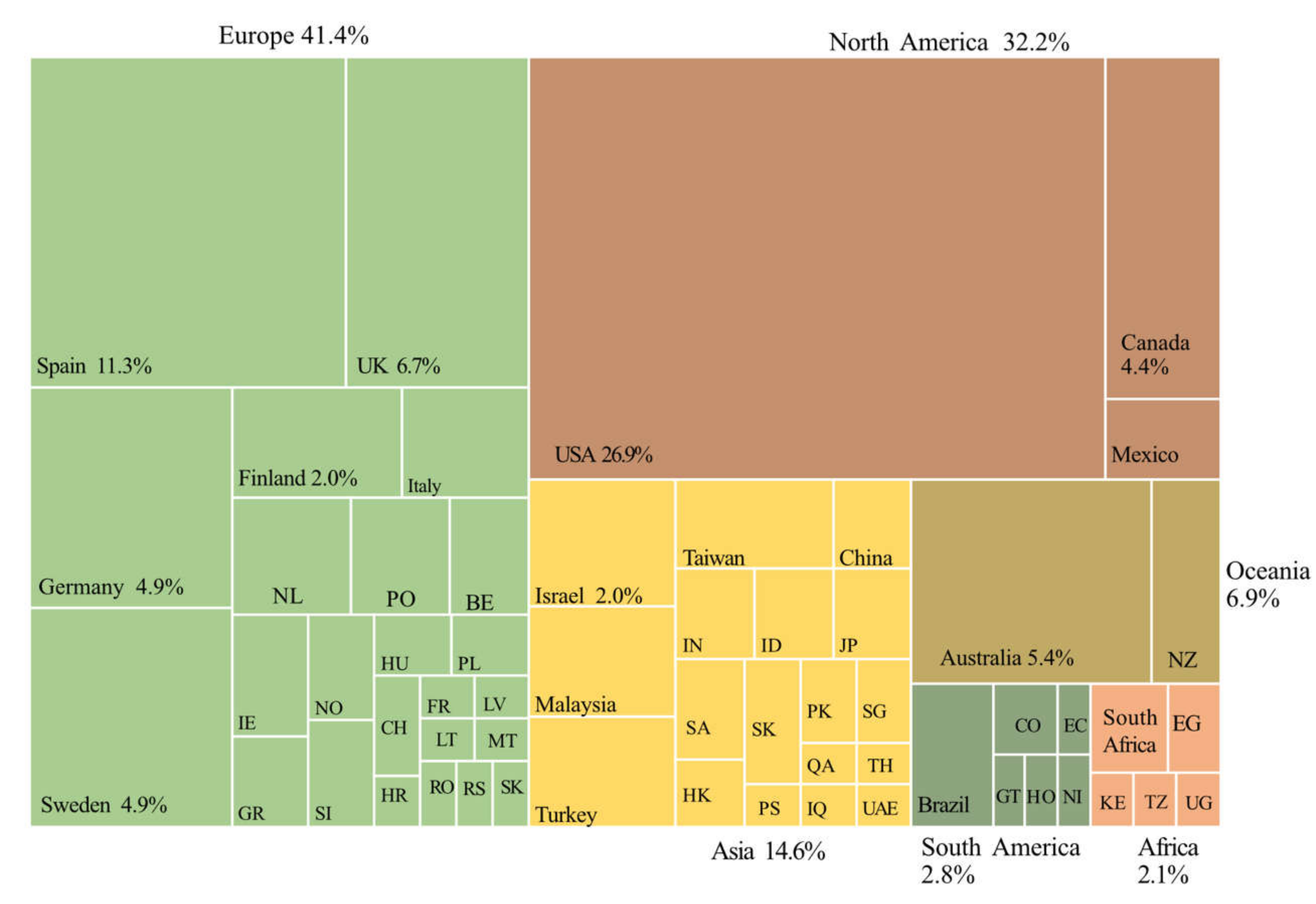
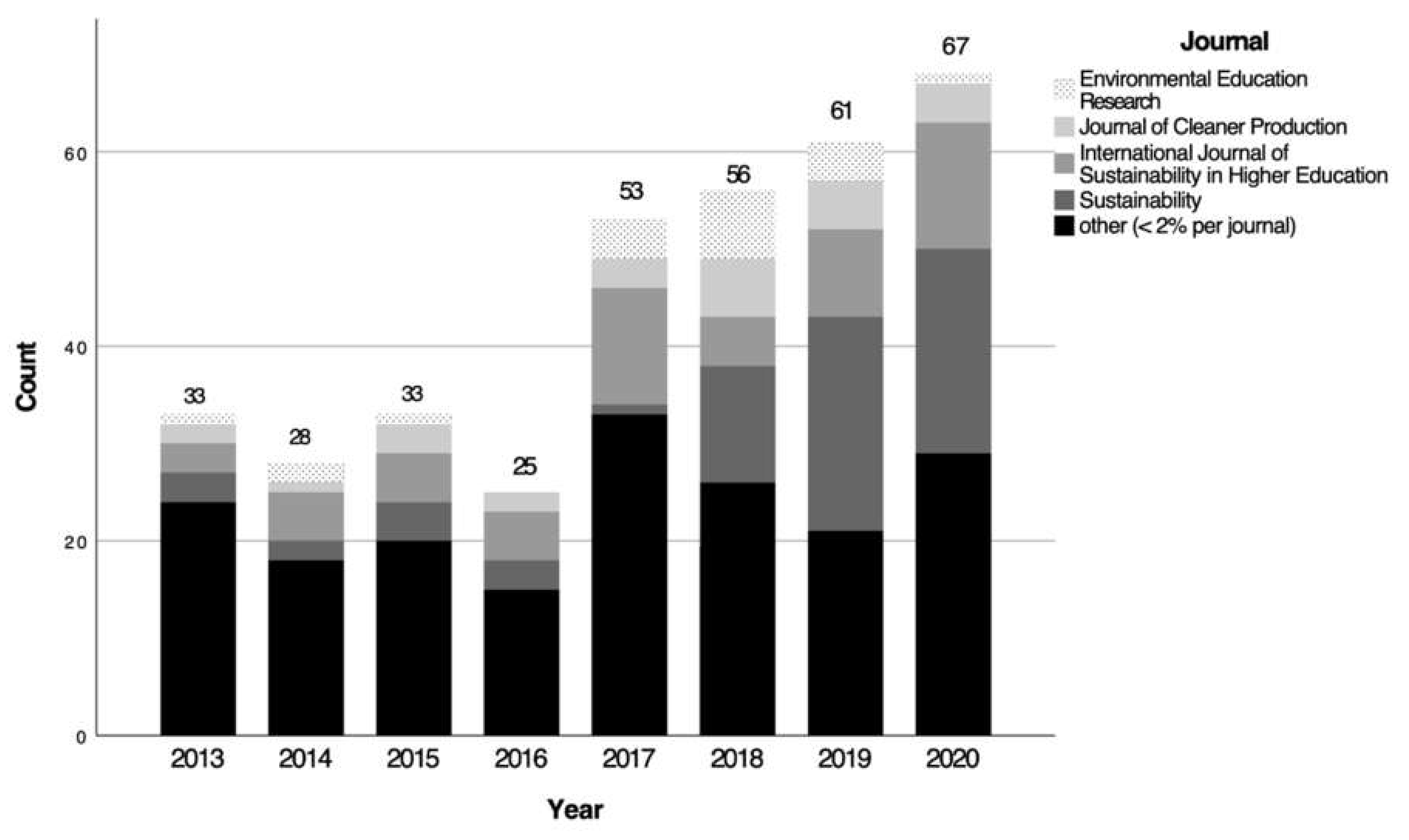
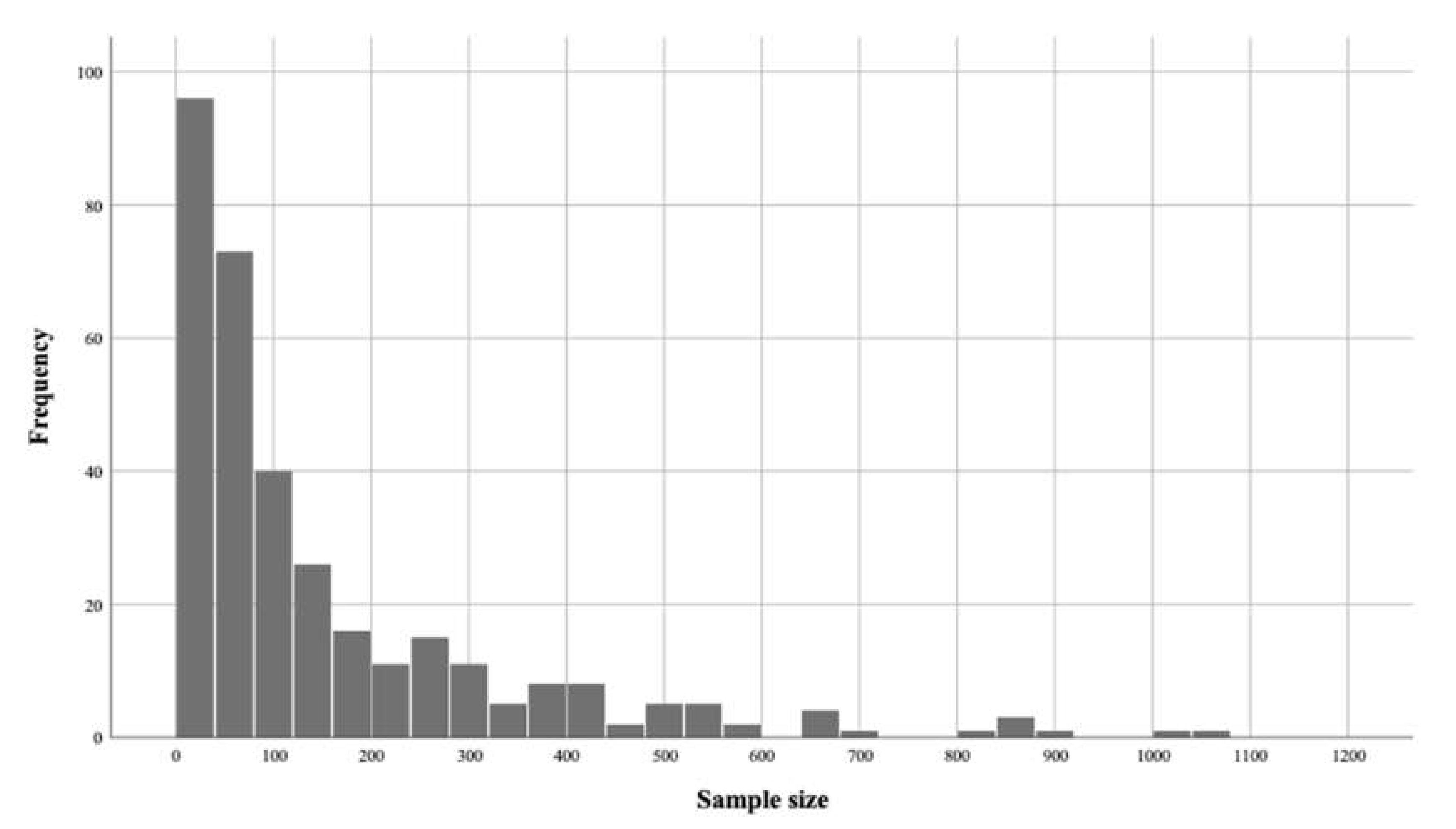
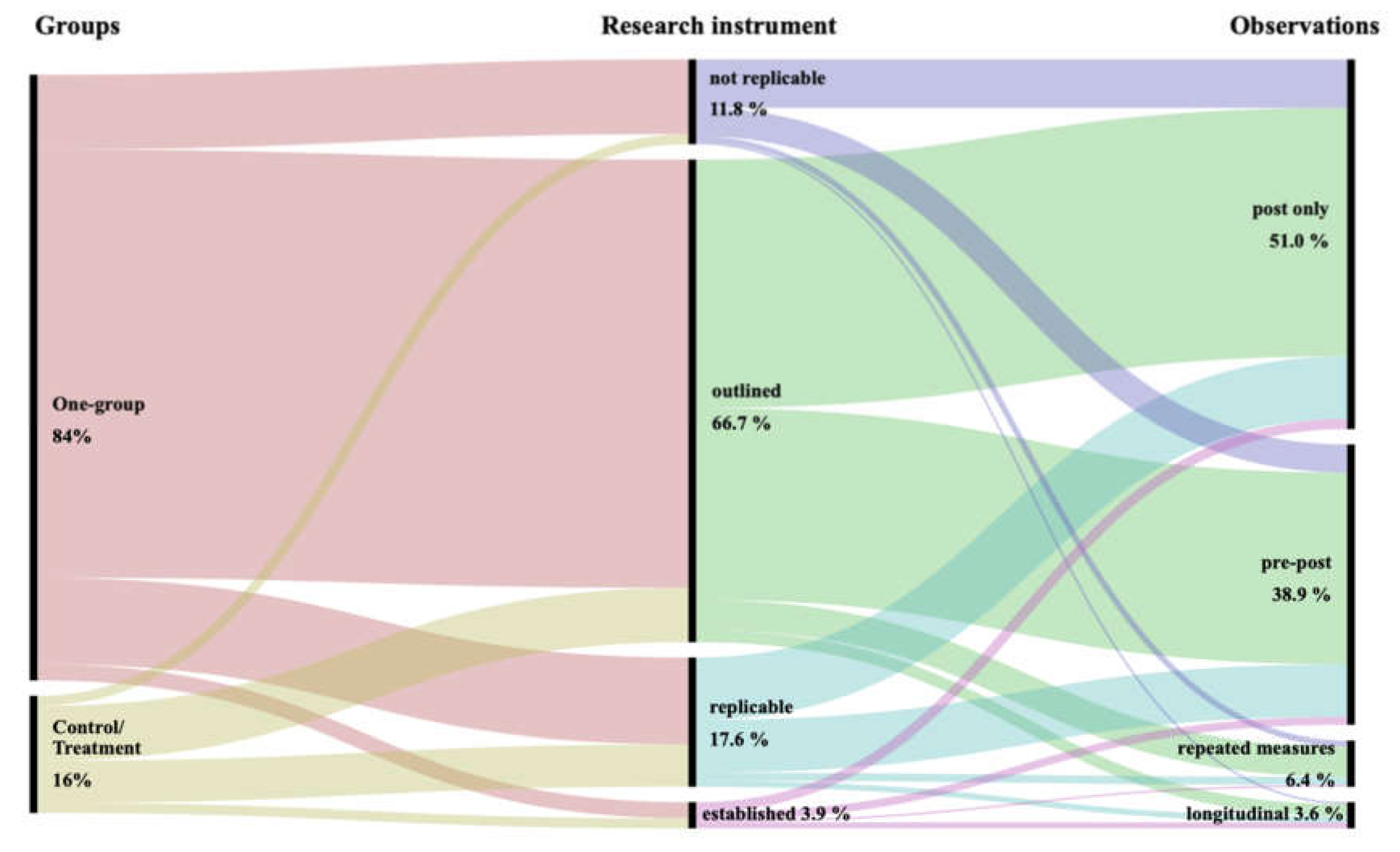
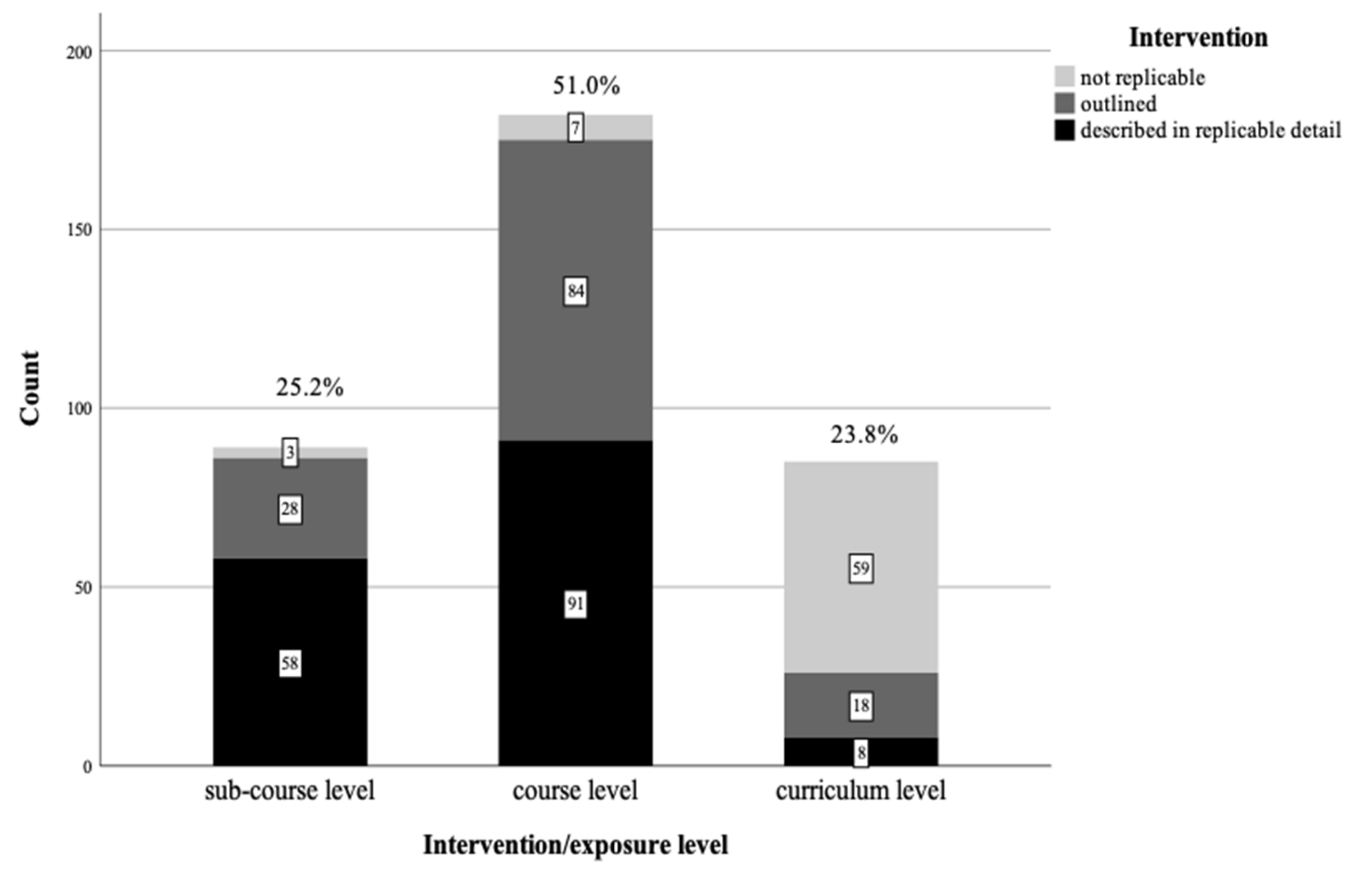
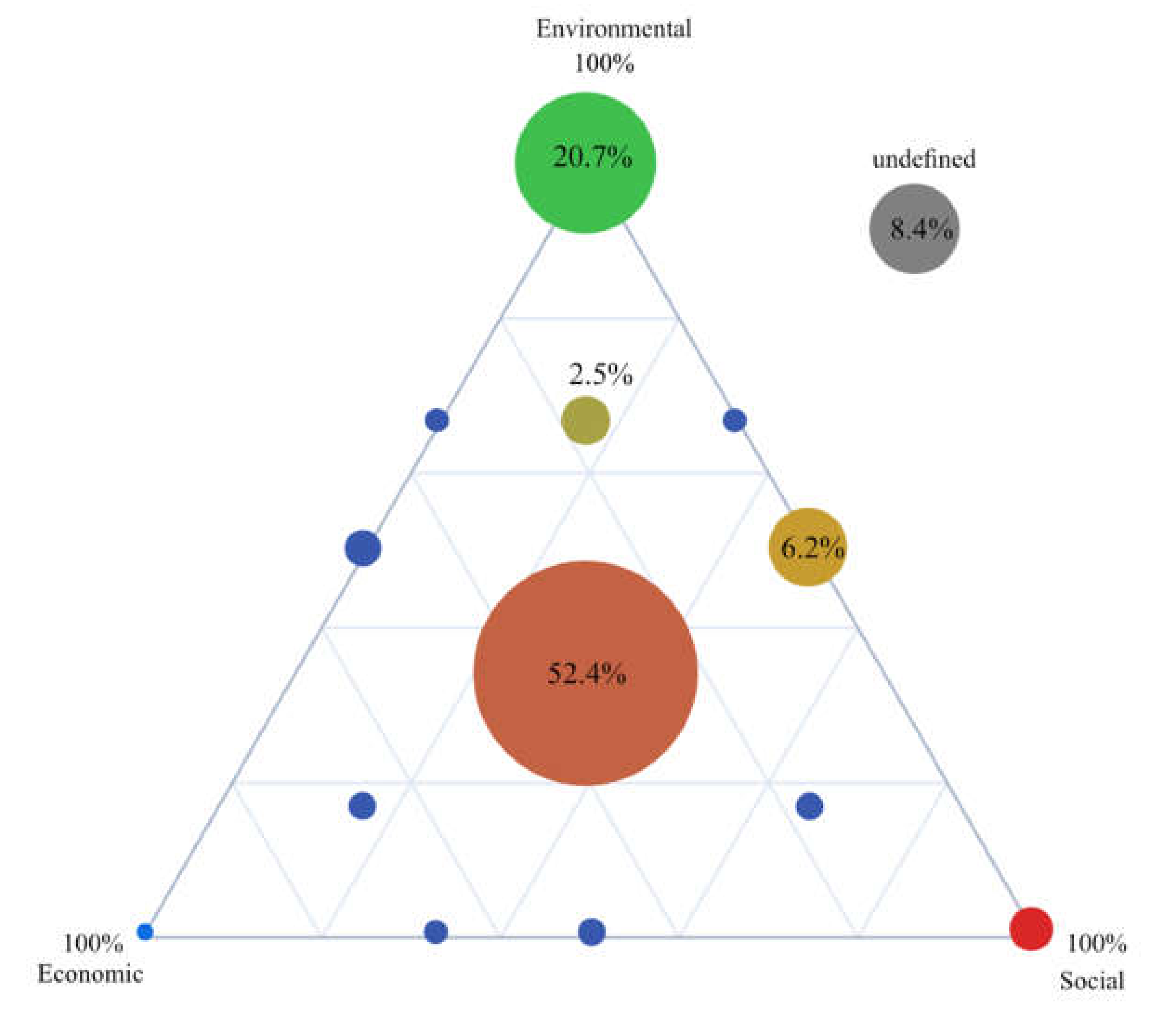
| Category | Variable | Scale/Notes |
|---|---|---|
| Research interest and design | Research question(s)/hypotheses/objectives | 0 = not specified; 1 = can be implied; 2 = explicitly stated; written summary |
| Groups | 1 = one group; 2 = two-group | |
| Repetitions | 1 = post only; 2 = pre-post; 3 = repeated measures; 4 = longitudinal | |
| Research instrument | 0 = not replicable; 1 = outlined; 2 = replicable and tested; 3 = established, written summary | |
| Susceptibility to bias | Sum of scores in groups, repetitions, research instrument: ≥7 low susceptibility; 4–6 moderate susceptibility; ≤3 rather susceptible | |
| Population | Study continent/country | in case of international studies, all countries recorded |
| Study sample | Characteristics (e.g., degree or course) recorded | |
| Sample size | Number of study participants | |
| Intervention | Level of intervention | 1 = sub-course; 2 = course level; 3 = program level |
| Intervention/pedagogy | 0 = not specified; 1 = outlined; 2 = described in detail | |
| Conceptualization of learning | 0 = not specified; 1 = can be implied; 2 = explicitly described; 3 = critically reflected on; written summary, key reference where stated | |
| Outcome | Conceptualization of sustainability | 0 = undefined; 1 = mono-dimensional; 2 = multi-dimensional; written summary |
| Conceptualization of intended effect | 0 = not specified; 1 = can be implied; 2 = explicitly described; 3 = critically reflected on; written summary, key reference where stated | |
| Summary of findings | written summary |
| Sustainability Outcome | Positive Prediction | No Prediction | Negative Prediction |
|---|---|---|---|
| Knowledge | ◉ ● ○ ○ ○ ○ ○ ○ ○ ○ | ● ● ● ○ ○ ○ ○ | |
| (Cap) abilities, skills | ◉ ◎ ○ ○ ○ ○ ○ | ● ○ ○ | |
| Attitudes, values | ◉ ● ● ○ ○ ○ ○ ○ | ◉ ◉ ● ● ○ ○ | ● ● ● |
| Behavior | ● ● ○ | ◉ ● ● ○ ○ | ◉ |
| Competences | ○ ○ | ○ |
| Sustainability Outcome | Positive Prediction | No Prediction | Negative Prediction |
|---|---|---|---|
| Knowledge | ◉ ● ● ● ● ● ● ● ● ● ● ○ ○ ○ ○ ○ ○ ○ ○ ○ ○ ○ ○ ○ ○ ○ ○ ○ ○ ○ ○ ○ ○ ○ ○ ○ ○ ○ ○ ○ ○ | ○ | |
| (Cap)abilities; skills | ◉ ◉ ● ● ● ● ● ○ ○ ○ ○ ○ ○ ○ ○ ○ ○○ ○ ○ ○ ○ ○ ○ ○ ○ ○○ ○ ○ ○ ○ ○ ○ ○ ○ ○○ ○ ○ ○ | ● ○ | |
| Attitudes; values | ◉ ● ● ● ● ● ● ○ ○ ○ ○ ○ ○ ○ ○ ○ ○ ○ ○ ○ ○ ○ ○ | ○ | |
| Behavior | ◉ ○ ○ ○ ○ ○ ○ | ◉ ○ | |
| Competences | ● ● ● ○ ○ ○ ○ ○ ○ ○ | ● | |
| Other | ○ | ○ |
| Sustainability Outcome | Positive Prediction | No Prediction | Negative Prediction |
|---|---|---|---|
| Knowledge | ● ● ○ ○ ○ ○ ○ ○ ○ ○ ○ ○ ○ ○ ○ ○ ○ ○ ○ ○ ○ ○ ○ ○ | ◎ ○ | |
| (Cap)abilities; skills | ● ○ ○ ○ | ◎ ● | |
| Attitudes; values | ● ○ ○ ○ ○ ○ ○ ○ ○ ○ ○ ○ ○ ○ | ◎ ○ ○ ○ ○ | ● ○ |
| Behavior | ● ● ● ○ ○ ○ ○ | ◉ ○ ○ ○ ○ ○ | ◉ |
| Competences | ◎ ○ |
| Sustainability Outcome | Positive Prediction | No Prediction | Negative Prediction |
|---|---|---|---|
| Knowledge | Being male ○ | Educational level of parents ○ Pre-university focus of education ○ Gender ○ | Being female ○ |
| (Cap)abilities; skills | Privileged social group ◉ | Gender ◉ | |
| Attitudes; values | Being female ◎ ● ● ○ Being older ● Regional origin ● | Educational level of parents ○ Pre-university focus of education ○ Gender ○ ○ | |
| Behavior | Being female ● ○ Regional origin ○ | Educational level of parents ○ Pre-university focus of education ○ | |
| Competences | Being younger ○ Being female ○ |
Publisher’s Note: MDPI stays neutral with regard to jurisdictional claims in published maps and institutional affiliations. |
© 2022 by the author. Licensee MDPI, Basel, Switzerland. This article is an open access article distributed under the terms and conditions of the Creative Commons Attribution (CC BY) license (https://creativecommons.org/licenses/by/4.0/).
Share and Cite
Probst, L. Higher Education for Sustainability: A Critical Review of the Empirical Evidence 2013–2020. Sustainability 2022, 14, 3402. https://doi.org/10.3390/su14063402
Probst L. Higher Education for Sustainability: A Critical Review of the Empirical Evidence 2013–2020. Sustainability. 2022; 14(6):3402. https://doi.org/10.3390/su14063402
Chicago/Turabian StyleProbst, Lorenz. 2022. "Higher Education for Sustainability: A Critical Review of the Empirical Evidence 2013–2020" Sustainability 14, no. 6: 3402. https://doi.org/10.3390/su14063402
APA StyleProbst, L. (2022). Higher Education for Sustainability: A Critical Review of the Empirical Evidence 2013–2020. Sustainability, 14(6), 3402. https://doi.org/10.3390/su14063402






